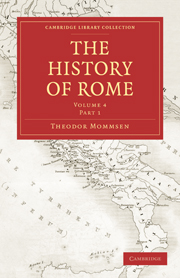Book contents
- Frontmatter
- PREFATORY NOTE
- Contents
- BOOK FIFTH THE ESTABLISHMENT OF THE MILITARY MONARCHY
- CHAPTER I MARCUS LEPIDUS AND QUINTUS SERTORIUS
- CHAPTER II RULE OF THE SULLAN RESTORATION
- CHAPTER III THE FALL OF THE OLIGARCHY AND THE RULE OF POMPEIUS
- CHAPTER IV POMPEIUS AND THE EAST
- CHAPTER V THE STRUGGLE OF PARTIES DURING THE ABSENCE OF POMPEIUS
- CHAPTER VI RETIREMENT OF POMPEIUS AND COALITION OF THE PRETENDERS
CHAPTER I - MARCUS LEPIDUS AND QUINTUS SERTORIUS
Published online by Cambridge University Press: 10 November 2010
- Frontmatter
- PREFATORY NOTE
- Contents
- BOOK FIFTH THE ESTABLISHMENT OF THE MILITARY MONARCHY
- CHAPTER I MARCUS LEPIDUS AND QUINTUS SERTORIUS
- CHAPTER II RULE OF THE SULLAN RESTORATION
- CHAPTER III THE FALL OF THE OLIGARCHY AND THE RULE OF POMPEIUS
- CHAPTER IV POMPEIUS AND THE EAST
- CHAPTER V THE STRUGGLE OF PARTIES DURING THE ABSENCE OF POMPEIUS
- CHAPTER VI RETIREMENT OF POMPEIUS AND COALITION OF THE PRETENDERS
Summary
When Sulla died in the year 676, the oligarchy restored by him ruled with absolute sway over the Roman state; but, as it had been established by force, it still needed force to maintain its ground against its numerous secret and open foes. It was opposed not by any single party with objects clearly expressed and under leaders distinctly acknowledged, but by a mass of multifarious elements, ranging themselves doubtless under the general name of the popular party, but in reality opposing the Sullan organization of the commonwealth on very various grounds and with very different designs. There were the men of positive law, who neither mingled in nor understood politics, but who detested the arbitrary procedure of Sulla in dealing with the lives and property of the burgesses. Even during the regent's lifetime, when all other opposition was silent, the strict jurists were refractory; the Cornelian laws, for example, which deprived various Italian communities of the Roman franchise, were treated in judicial decisions as null and void, and in like manner the courts held that, where a burgess had been made a prisoner of war and sold into slavery during the revolution, his franchise was not forfeited. There was, further, the Aristocrats remnant of the old liberal minority in the senate, which in friendly former times had sought a compromise with the reform party and the Italians, and was now in a similar spirit inclined to modify the rigidly oligarchic constitution of Sulla by concessions to the Populares.
- Type
- Chapter
- Information
- The History of Rome , pp. 3 - 36Publisher: Cambridge University PressPrint publication year: 2010First published in: 1866



